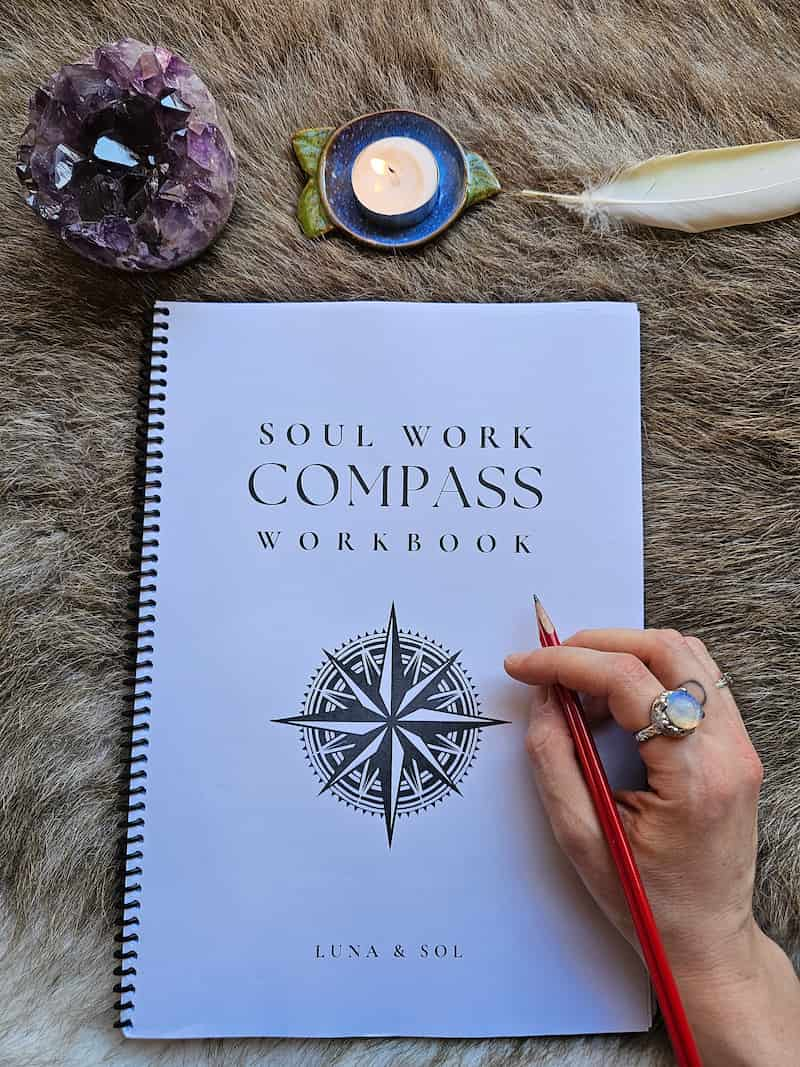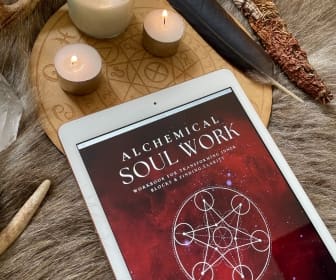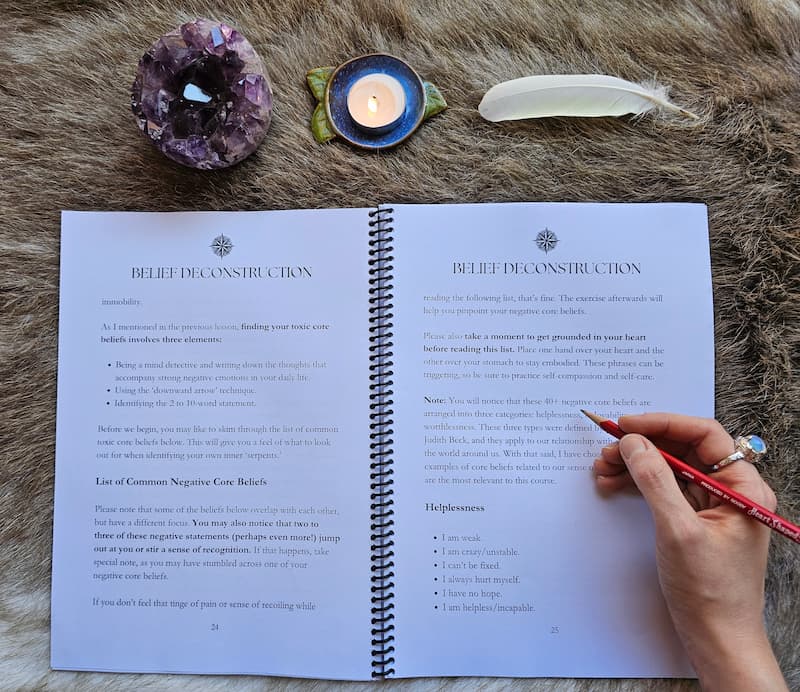When you first dig up the festering mess of your core beliefs from the depths of your being, you’ll likely experience one of three emotions: excitement, confusion, or grief – or all three at once.
As one of the most fundamental practices on the inner journey of soul work, uncovering our toxic core beliefs is definitely not a clean or sanitary path.
But it is vital.

Soul Work Compass Course:
Drifting through life without direction is exhausting. If you feel paralyzed by confusion or self-doubt, this course is your map out of the fog. We guide you safely through your inner darkness to uncover your true needs, values, beliefs, wounds, and sacred gift. Turn your confusion into crystal-clear direction and find your True North today.
We ALL carry our own devilish assortment of toxic core beliefs that eat away at our sanity on either a conscious or unconscious level. Typically, they influence every level of our being.
To effectively develop self-love, open our hearts to others, and experience more inner peace, we need to turn inwards. We need to illuminate the darkness. Going in search of your core beliefs is one of the most essential paths for true and deep healing because it goes to the center of your suffering.
Table of contents
What Are Core Beliefs?

Our core beliefs are the unconscious stories, convictions, and judgments we carry about ourselves that define our sense of self. Core beliefs also determine how we feel about others, how happy we are with ourselves, and how we perceive the world at large.
Our core beliefs are even responsible for how successful we are in self-actualizing our deepest dreams and uncovering our personal meaning of life. In short, our core beliefs influence every aspect of our lives. Typically, our core beliefs first develop in childhood and solidify in adulthood.
Core Beliefs and Spiritual Awakening
We heal ourselves on the mental level as we become aware of our core beliefs, release those that limit us, and open to more supportive ideas and greater understanding.
– Shakti Gawain
The whole point of the healing journey of awakening is to loosen our attachment to that which is false and limiting – and this includes our core beliefs. These core beliefs can become so dense and constricting that they contribute to a Dark Night of the Soul (or spiritual crisis).
In Indian philosophy, core beliefs are related to the idea of samskaras, or patterns of conditioning that we continuously repeat in our lives. To connect with our True Nature, we need to become aware of these inner contractions that tend to undermine, control, and pollute our way of living and being.
Why You Keep Repeating the Same Toxic Patterns

Just when you think you have a pretty good idea of who you are … just when life seems to be going well … everything starts spiraling downwards …
Want to get LonerWolf at the top of your Google search results?
Have you ever felt this way before?
(Note: most of us have at some point in our lives!)
We’ve all experienced periods of life where everything is sunshine and roses. We seem to be on the right track. And then – out of nowhere – a mysterious depression descends upon us. (Surprise! ) Or we get a huge anxiety attack that cripples our self-esteem. (Surprise!) Or we self-sabotage, attract the wrong person into our lives, and wind up heartbroken. (Surprise!)
Why does this happen?
You can probably guess what I’m going to say. Yes, our core beliefs are what happened.
“But I’ve focused so much on self-growth and spirituality – what’s going wrong?” you might lament.
My answer is that, most likely, you haven’t gone deep enough into your psyche to undo your old patterns. You’ve most likely taken the outside-in approach where you:
- change your diet
- take care of your body
- ‘hack’ (optimize) your daily routines
- read lots of self-help books
- do sexy yoga
- organize your life
… but for the most part, these are all very external or superficial practices. No matter how much you work on your external life, you still find yourself consumed by toxic shame, anger, self-pity, and self-destructive behaviors.
Don’t worry, it’s not your fault. No one taught you that you need to take the hard path, peek underneath the curtain of your mind, and shine a torch into its deepest recesses.
That’s where this article (and our whole website) comes into play.
Would you like to save this?
Your information will never be shared.
Examples of Core Beliefs to Look Out For

A core belief is not an everyday garden variety belief that pops up spontaneously – it is the mother of all beliefs, the Big Kahuna of suffering, and the King or Queen of your own personal underworld that becomes the central part of your shadow self. This is why shadow work is one of our most recommended methods for exploring our core beliefs.
Often, we are completely unaware of what our core belief/s are (even if we think we are “conscious”!) – and it is quite common to disbelieve their existence.
As I mentioned at the beginning, discovering your core beliefs will cause you to feel a cocktail of surprising emotions (from grief to disbelief). But whatever the case, the truth is that we all have core beliefs and we’re all manipulated by them.
“But I’m a spiritual person: I’ve dedicated so many years to self-improvement!”
Maybe so. But if you’re still continuing to suffer, chances are that you haven’t done the dirty work of digging through the quagmire of your mind first.
In fact, I once used the same justification to avoid the fact that I struggled with some very real, very problematic core beliefs. Eventually, I learned the hard way. Thanks to the constant re-emergence of toxic guilt and shame I developed due to childhood conditioning, I discovered three main core beliefs about myself: (1) I am bad, (2) I’m not good enough, and (3) I’m an imposter.
I was a little speechless when I discovered these core beliefs! They seemed so familiar, so big and scary – and yet there they were, condensed into simple little sentences that I could imagine a sad and scared little child repeating. (And indeed, they do come from the wounded inner child.)
Here are some other examples of common toxic core beliefs that we carry inside. Pay attention to those that generate feelings of discomfort within you:
- I am irredeemably flawed.
- I am unlovable.
- I am bad.
- I am stupid.
- I am worthless.
- I am a loser.
- I don’t deserve good things.
- I am a failure.
- I am weak.
- I am not enough.
- I don’t matter.
- I am boring.
- I am crazy and unstable.
- I can’t be fixed.
- I always hurt people.
- I always hurt myself.
- I have no hope.
- I am evil/sinful.
- I am unwanted.
- I am invisible.
- I am a mistake.
- I am helpless.
- I am ugly.
- I am shameful.
- I am uninteresting.
- I will die alone.
So, which of the above core beliefs stood out to you?
Keep in mind that the above list only displays a sample of the many possible core beliefs that could exist within you. If you want to use the exact “Belief Deconstruction” method I used to find my top three core beliefs, see the Soul Work Compass Course.
5 Ways to Uncover Your Core Beliefs (the Fundamentals)

It is vital that you uncover as many of your core beliefs as possible.
Here is what you need to know:
1. They always start with “I am…”
Go and revisit the list of toxic core beliefs above. Can you see how nearly all of the toxic core beliefs start with “I am …” Others start with “I don’t,” “I always,” etc., which tend to sound quite judgmental. Remember that your toxic core beliefs will be in black and white language that condemns you in some way.
2. They are often disguised by supporting beliefs
Yes, these little imps don’t like being spotted. So look out for supporting beliefs that uphold your central core belief/s. Supporting beliefs often sound like the following:
- “She never cared for me” (I am unlovable)
- “He is such a show-off, I can’t stand it” (I am unimportant)
- “They’re always messing everything up” (I am helpless)
- “I’m sorry that I keep making mistakes, I’m a klutz” (I am a failure)
Pay attention to the things that you often say that make you feel a little insecure, self-conscious, or embarrassed. These uncomfortable emotions will help you pinpoint a supporting belief statement that contains a core belief of yours.
3. Practice journaling and try the ‘why?’ technique
Record the thoughts you have about yourself and other people during the day.
For over 12 years, we've poured our hearts into creating free content on this website. Unlike many platforms, we believe this guidance should be accessible to everyone. If this post empowered you in any way, please consider making a donation to keep us going. Any amount (one-time or ongoing) makes a huge difference.
Next to each thought, ask “Why?” and ask the questions, “Why is that so bad?/Why is that so important?” Keep asking these questions until you reach a core answer.
For example, you might write, “I hate how my friend keeps interrupting me.” Why is that so bad? “Because I want to be listened to.” Why? “Because I want to be cared for.” Why? “Because I feel like no one cares about what I have to say.” Why is that so important? “Because I feel alone and worthless.” From this example, we can infer that the core beliefs are “I am worthless” and/or “I am alone.”
We offer a guided approach in the Soul Work Compass Course if you’d like a simpler and more structured approach.
4. Painful emotions are your friends
Uncovering your toxic core beliefs can be invigorating and empowering – but also intimidating and a little scary. Remember that painful emotions are your friends.
When you pay attention to the fluxes and surges of unpleasant emotions from a place of compassion, it helps you uncover your inner blockages. Do you feel anxious, gutted, enraged, self-conscious, insecure, nauseous, or otherwise uncomfortable in your own skin? Good. You know that you’re coming close to unveiling a core belief of yours.
It’s like pulling out a splinter: you’ll feel the pinch of sharp pain first, but that’s a necessary part of the healing process. It all starts with befriending your painful emotions.
5. Practice self-compassion
As you can see, being kind to yourself (self-compassion) is a crucial part of this process. Extracting your toxic core beliefs can backfire if you use the information as an opportunity to bully yourself. Please don’t do that. You didn’t choose to have these toxic core beliefs: they developed as part of your childhood wounding and conditioning.
So be compassionate and go at your own pace – that will make this journey into something nourishing and empowering, not into a witch hunt meant to ‘eradicate’ all of your demons. I help you learn how to befriend yourself through a series of 60+ healing activities and deep-dive prompts in our Self-Love Journal if you need more support.
How to Change Your Toxic Core Beliefs in 9 Steps

As we’ve seen, core beliefs are the fundamental convictions we have about ourselves – the so-called “absolute truths” we have adopted throughout our lives, usually starting in childhood.
For example, if we had an emotionally unstable father as children who constantly punished us and called us “stupid,” it’s likely that we would then develop the core belief that we are “stupid” or “worthless” growing up. Or if we had a neurotic mother who was constantly warning us to “be safe,” we might have developed the belief that “we are not safe,” creating an endless array of psychological problems in our later lives.
Once you have discovered your core beliefs, the next step is to actively replace them. Below, I’ll show you how to change your core beliefs in a relatively straightforward way.
Don’t forget that you can start our Soul Work Compass Course now if you want more structured help in identifying your core beliefs (as well as your core wounds, core needs, and core values – all using the power of spiritual alchemy to empower you).
Keep in mind that any form of inner work demands time, energy, and persistence. But remember, everything you put out is returned to you tenfold!
1. Identify one core belief at a time
It’s pointless to try to rush the process of healing by trying to solve every core belief you’ve identified all at once. Start with the most severe and persistent core belief first. Often, you’ll discover that there is one main core belief that seems to pervade a lot of what you think, feel, and do. Target this one first. The smaller and less persistent core beliefs (i.e., the ones that fluctuate with your mood) can come later.
2. Understand how the core belief impacts your life
To truly motivate yourself to change your core belief, you must genuinely understand its impact on your everyday life and your life at large. Meditate or write down the answer to the following question: “How does this core belief impact my life?” You might respond, for instance, “It stops me from feeling confident. It makes me more anxious in public. It makes me doubt and hate myself. It causes me to lose friendships,” etc. Knowing how your core belief harms you will motivate you to make some serious changes.
3. On a scale of 1 to 10, how much do you believe it?
Often, our core beliefs sound completely ridiculous. To the conscious mind, it’s easy to laugh at them and dismiss them. But on an unconscious level, they still remain within us, wreaking havoc. For this reason, it’s important for you to sit down and really reflect on how much you truly believe in your core belief. Don’t forget to be genuine and tell the truth – this can be hard!
On a scale of 1 (don’t believe at all) to 10 (strongly believe), rate how much conviction you have in your core belief. If your score is above 5, ask yourself, “Why do I believe this is true about myself?” You might like to note down or reflect on past memories or experiences that uphold your belief. If your score is below 5, try to identify any emotions (such as fear) hiding behind your disbelief.
4. Explore hidden forms of resistance
Sometimes people hold a core belief that is very strong. When they are presented with evidence that works against that belief, the new evidence cannot be accepted. It would create a feeling that is extremely uncomfortable, called cognitive dissonance. And because it is so important to protect the core belief, they will rationalize, ignore and even deny anything that doesn’t fit in with the core belief.
– Frantz Omar Fanon
There are many reasons why we consciously or unconsciously refuse to change our old core beliefs. Usually, the reasons involve fear of failure, fear of change, and fear of uncertainty. If we have been habituated to think and behave in a certain way all our lives … what will happen if we don’t anymore? And furthermore, what will happen if we fail? Before you try changing your core beliefs, you need to be able to deeply commit to the journey. By becoming conscious of what is holding you back from changing your core beliefs, you will prevent self-sabotage.
5. Find ways to disprove your core belief
Now that you have rated how much you believe in your core belief, try looking at the “big picture.” By finding ways to disprove your core belief, you will prove to your unconscious mind that you are no longer being positively served by this deeply held conviction.
For example, if your core belief is “I am unwanted,” you might like to deliberately look for ways you have been wanted before, e.g., you might write down “When I was 10, my teachers wanted me to be in charge of the class presentation. When I was 16, someone had a crush on me. When I was 19, my friend got upset with me for not wanting to go with her to the movies. Every year, my relatives want me to come to the Christmas get-together. My partner wants to be with me …” and so forth.
6. Find an alternative core belief
After discounting your core beliefs and proving them to be flawed and unrealistic, it is now time to replace them. Find an alternative core belief that contradicts what you currently believe. For example, if you have the core belief “I am ugly,” you might like to replace it with “I am beautiful.” Or if your core belief is, “I am a loser,” you might replace it with, “I am unique.”
It’s important that you choose a core belief that you genuinely believe in. Beware of going over-the-top with your core belief (e.g., “I am rich and famous”). Instead, try to be realistic and down-to-earth. Affirmations can help in this step.
7. Explore how your life will change with your new belief
How will your new core belief transform your life? Will it help you to be more joyful, confident, creative, or prosperous? Reflect on, or write down your thoughts. Go into as much detail as you like and take pleasure in visualizing the future.
8. If you don’t change your core beliefs, what will be the consequence?
It helps to keep in mind the natural consequences of continuing to cling to a toxic core belief. Not only will this help to motivate and keep you on track, but it will also help to reassert the true value of your journey.
9. Develop a plan of action
After identifying, challenging, and replacing your core belief, you need to have a plan of action in place. Ask yourself what you plan to do in the next month to constantly override your thinking patterns that are associated with your negative core belief.
For example, you might plan to remind yourself of three ways you are lovable every time your core belief “I don’t deserve to be loved” pops up. Some other ideas include:
- Keeping a journal where you record your progress
- Setting aside time every day in solitude to introspect
- Looking at yourself in the mirror every morning, repeating your new healthy core belief sincerely
- Visualizing/hypnotizing yourself into a suggestible state that prepares your unconscious mind for change
The possibilities are limitless. And remember that it’s normal to slip up or forget – just be gentle with yourself and keep persisting!
If you’re looking for a place to start, I recommend exploring mirror work and coupling this with an empowering affirmation (see step 6 above again).
A Simple, Structured, and Powerful Way of Finding Your Core Beliefs

Reading about toxic core beliefs is one thing. Actually finding yours – and doing something about them – is another. That’s exactly what the Soul Work Compass Course was created for.
Using the timeless framework of alchemy, this 12-lesson journey guides you step by step through identifying your core wounds, deconstructing the limiting beliefs keeping you stuck, clarifying your non-negotiable values, and – most powerfully – authoring new beliefs that actually reflect who you are at a soul level.

Overwhelmed by where to begin?
The Alchemical Soul Work Workbook is your map and compass. It takes the guesswork out of deep inner work, empowering you with a step-by-step process to confidently find clarity and alignment with your true Self.
You’ll walk away with your own personal Soul Compass: a tangible, fillable document that becomes your north star for making aligned decisions and living with genuine authenticity.
This isn’t surface-level self-help. It’s the deep, structured inner work that transforms repetitive cycles of pain into a life of real meaning and direction. If you’re ready to stop surviving and start living from your truth, the Soul Work Compass Course is where that journey begins.

***
As you walk the challenging, but deeply fulfilling path of uncovering your core beliefs, remember that some core beliefs are more persistent than others.
It’s common for some core beliefs to fluctuate with your emotions (pay attention to these), but also look out for those that emerge even when you aren’t feeling emotional (these are often the deeper, more serious core beliefs).
Replacing your core beliefs will take time and effort, but the rewards are endless and priceless. Increased self-esteem, creativity, productivity, prosperity, joy, fulfillment, and love are some of the many gifts you will receive throughout this journey.
Tell me, have you discovered any of your core beliefs? What are they? Feel free to share below. And also, if you benefited from this article, please share it with a loved one!
If you need more help, we offer 2 powerful ways to guide you on your inner journey:
1. The Soul Work Compass Course: Break free from feeling lost and disconnected. The Soul Work Compass is a practical 12-step course that transforms soul loss into soul clarity. Discover your core values, heal core wounds, and create a personalized compass to guide every decision you make.
2. The Inner Work Journal Bundle: Heal at the root. This Inner Work Journal Bundle guides you through self-love, inner child healing, and shadow integration with 150+ prompts and activities. You get editable digital files to use on any device or print unlimited times. Not for lukewarm seekers, these journals are for those ready to transform.

 $3
$3
Your article is very interesting. My main core belief is “I am ugly” that lead to other beliefs such as “I am unlovable”. The problem is that my first core belief has been confirmed by a lot of events, and a lot of people so I really don’t know how to get rid of it. Any tips?
Mine is: I Am Not Enough.
It’s always there. It won’t go.
I’m so tired.
Another great article which got straight to the heart of my issues. My core belief is/was “I am an evil person”. I had this from being 10 years old. Even though I did a lot of bad things when I was younger, I have been pretty good for about 25 years. I have reframed my unhelpful core belief as “I have the power to do good.” This feels refreshing but also very fresh and precarious. Hopefully it will firm up over the next few days and weeks. Thank you again for your wise words.
17 all stemming from childhood between the sexual abuse and emotional abuse, being bullied for being half native/half irish and a bigger kid, my parents divorce, reversed roles as a child due to the alcoholism. I thought doing a 4th step in alcoholics anonymous was having to get brutally honest with yourself. At least some of my baggage got unloaded there.
Core beliefs are tied to experiences. Once a core belief is identified, forgiveness of yourself and others is often the quickest way to release a destructive core belief.
Hi Luna & Sol,
I appreciated the synchronous timing of this email and post. I had just pulled a Venom archetype card to work through in my future. And then just a couple days later got this email, and well, here we are!
I appreciate the framework and steps provided in this post, and I do feel that for myself I benefit from having structure to work through. Could you help me discern around doing the practices laid out in this article, compared to the Shadow Work Journal or Inner Child Journal you have? Is there any overlap? Or would you see each as uniquley suited to addressing the specific issue? I guess I’m contemplating starting with this article first on the journey of meeting and transmuting toxic core beliefs, or if doing one of the Journals (perhaps Shadow Work?) will provide more structure but also help to address the items covered in this article?
Thank you!
Hey Evan, thanks for sharing here.
Really, to answer your question, it depends on your intention. If you’re looking to undo a specific negative behavioral pattern (like an addiction, etc.) I recommend using this article as a basis for your inner work. However, if you’re looking to do holistic/larger scale inner work, I recommend the Inner Child and/or Shadow Journal.
I hope that helps! ♡
As a child my mother would say all sorts of things that made one of my core beliefs that I am unlovable or unlikable. Another that I’m bad to have certain feelings like anger or jealousy, I’ve always been scared of those feelings like something wrong with me.
Thank you for this article. I’ve been trying to heal for a few years now. I’ll try by following your suggestions. Also working on my self compassion which I lack greatly.
I’ve been journaling for several years now, and I agree that they’re a powerful tool. I notice how similar themes often reappearing; such us abandoned, unwanted, misunderstood inner child, etc… Reading the article, I start to go through them again. Your point which says that it’s possible to have more than one toxic core beliefs pops out to me, and also makes me wary in the same time. Because it seems to me that my multiple core beliefs have been entangled with each other—seems like it won’t be easy to tell which one of them is more dominant. Thanks for writing these, as always. It will help to guide me while digging into this confusing, dark entangled mess in me. Lots of love and howl for you, Luna :)
It helps to know that everything, in time, finds a resolution – that’s the nature of life. So keep going, no need to force too much inner excavation, and trust in your Inner Light. The very fact that you’re interested in untangling the inner mess is enough. Thank you S.B. for your comment. :)
This was an incredible essay and teaching that I must come back to. and absurd.
Thank you Dan (the absurd part is confusing though?)
After reading this article, I have done more listening to my internal thought processes than normal. More relaxed investigations, rather than getting lost in assumptions and obsessive thoughts.
Mostly in the past I have only done this when feeling down or anxious about future health or well-fare developments.
As a need to solve personal issues, or past problems cluttering for attention and over thinking things. Which bring on stress
and anxiety problems.
So using this skill, I have discovered thoughts which I call downplay. Where I think of previous achievements or activities with others, but for some reason I down play my part in them. Why? Well it seems a case of self negation. Why? I don’t see my abilities as confident compared to others. Why? Lack of completeness in early growth and development with out conditioning.
Another example is being verbally negative to my wife and others at times. Why? I feel my needs not being met. Why? Due to being stuck with a sick wife, and coping on a Pension. Why? Age, lack of funding, no incentive to do past activities!
This last one is where I tease and frustrate others when I do not want to listen to their pet talks. Why? It’s my way of letting out angry feelings without letting it all out fully. Why ? I guess it’s part my shadow side.
So it can be seen that this new found skill set will become part and parcel of coping and growth in Spirit …THANK YOU!
It’s a pleasure to help, as always John! ♡
What a beautiful, inspiring and touchingly honest look at yourself. It brought a smile on my face…. I wish and pray for your healing in this (and your wife’s) wherever you may be.
P.S. it inspired me to also take a kind yet honest look at my core beliefs
Thank you, as always for the insights and reminders. For me, this is all about “attachments”. We all have them, be they people, things or ideas. Becoming aware and giving these things a name while dropping or letting go of the same, without comment or judgement, releases them one at a time. Of course, there are dozens even thousands, but it gets easier as one lets go of all that went before.
Thank you for this angle, Christopher ♡